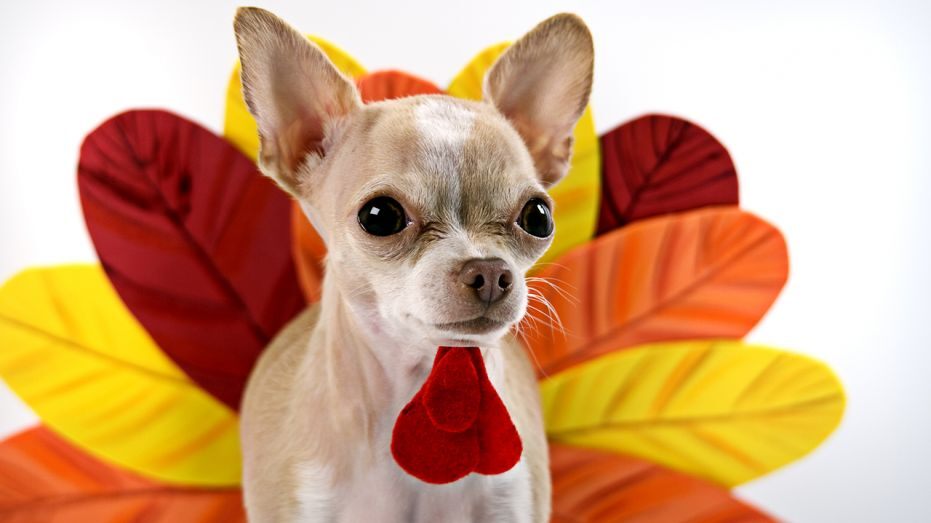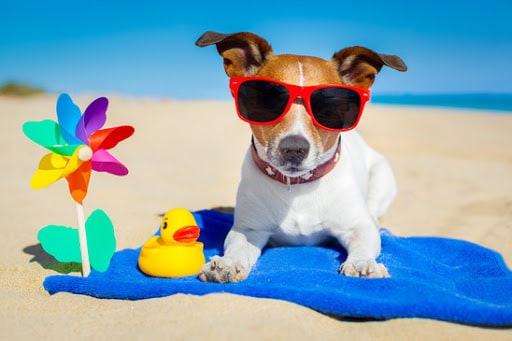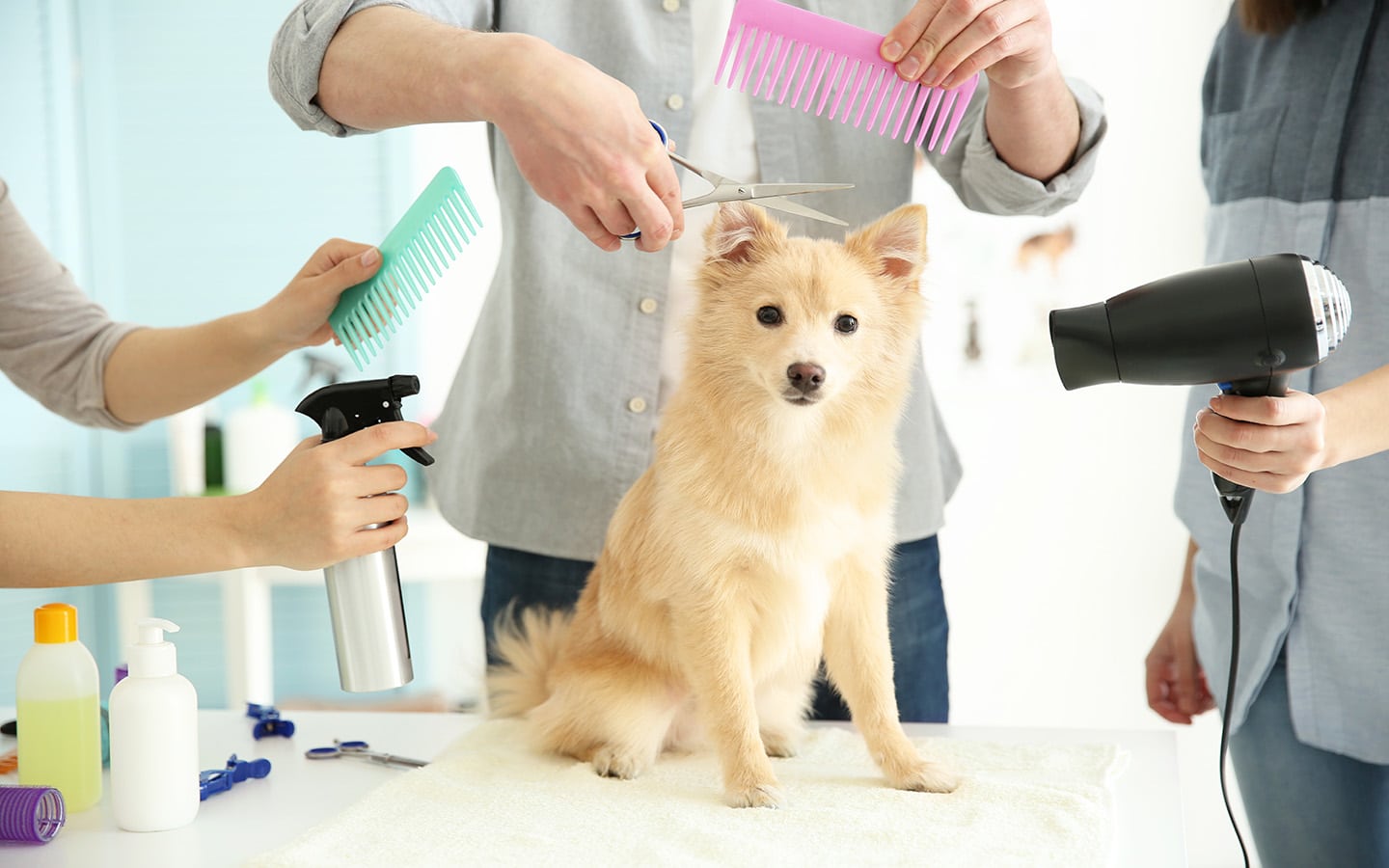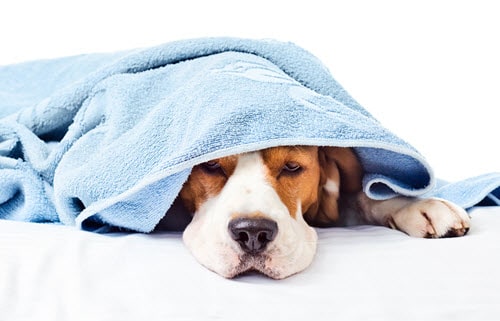Heat and Sun Exposure When there is hot sun, high humidity and hot temperatures, the…
HOLIDAY HAZARDS TO YOUR PET
Holidays can be especially stressful for pets—the family’s normal routine is changed, there’s increased excitement with the holiday festivities and often, additional guests and their pets are visiting in the home. With a little thought and preparation, you can make the holidays safer and less stressful for your furry family members.
Hazardous Holiday Foods
Chocolate is something most of us enjoy during the holidays—but don’t share your love of chocolate with your pets. Chocolate is very toxic to pets. It can cause vomiting, diarrhea, lethargy and/or hyperactivity. If ingested in large amounts, it can cause tremors, seizures, an increased heart rate, respiratory failure and even death.
Xylitol is a sugar substitute used in many holiday sweets. It can cause vomiting, loss of coordination, seizures, and in severe cases, liver failure. It can also cause a spike in insulin, resulting in severely low blood sugar.
Grapes and raisins (dried grapes) should never be given to a pet as they can develop acute kidney injury (the sudden development of kidney failure) with anuria (a lack of urine production).
Unbaked bread dough is dangerous to feed your pet. Once the dough is in the stomach, it acts as an oven and metabolizes the yeast into carbon dioxide and ethanol. The excess carbon dioxide can cause the animal to bloat and the ethanol can result in alcohol poisoning.
Although no one would intentionally give their dog or cat an alcoholic beverage, drinks left unattended could provide the opportunity for them to lap up the alcohol. Other holiday goodies containing alcohol, such as rum cake, might give them alcohol poisoning as well.
Turkey and turkey skin, as well as other high fat foods, may cause pancreatitis, which is inflammation of the pancreas. Turkey bones and other bones can splinter, puncturing internal organs. In addition, avoid giving your pet spicy foods that can cause gastrointestinal disorders.
Dogs show toxicity to macadamia nuts. If eaten, they can experience vomiting, weakness, fever, muscle tremors and depression. There may also be a mild increase in liver enzymes.
Many holiday foods contain onions, garlic, leeks or chives. These foods from the allium family contain an ingredient called n-propyl disulfide which is toxic to cats and dogs. The ingestion of these ingredients results in a condition called hemolytic anemia, which is characterized by damage to the red blood cells. This toxicity can cause the red blood cells circulating through your pet’s body to burst, which results in your pet’s urine becoming red or brown. In severe cases, the anemia may lead to internal organ damage, organ failure or even death.
Guests love to give our pets treats, but they may not understand the dangers that human food sometimes poses to them. You would do yourself, and your pet, a favor if you instruct your guests not to feed your dog or cat table scraps and other human treats. If your guests insist on spoiling your fur baby, provide them with dog or cat treats that are pre-approved by you.
During holiday parties, be sure to keep any trash secure and out of the reach of your pet. Animals love to get into the trash and help themselves to any discarded food from our plates. Disposing of trash in an area that your pet can’t access will prevent your pet from becoming sick and avoid a costly holiday trip to the veterinarian.
Holiday Decorations
Be sure to anchor your Christmas tree securely in its stand. Pets, especially cats, are curious and may climb up onto the tree, resulting in injury should the tree tip over and fall on them. Stagnant water from the Christmas tree may contain mold, bacteria or water additives that could cause nausea and vomiting should your pet drink it. The tree needles may cause gastrointestinal irritation, obstruction and puncture.
Holiday ornaments have sharp edges that could cause perforations and lacerations to pets that chew on them. Tinsel and ribbons can become a sparkly “toy” that catches the attention of your dog or cat. Playing with these items can result in choking, or they can ball up in the stomach or intestines causing an obstruction, if eaten.
Holiday lights are bound to attract the attention of inquisitive pets, particularly puppies and kittens. Chewing on electrical cords can result in electrical shock, burns or cardiac arrest.
Candles are another irresistible curiosity for pets, who are captivated by their flickering glow. Pets that put their paws into the flame can experience severe burns, or cause a fire should they knock over a candle.
Many snow globes contain anti-freeze which is highly toxic to dogs if they come in contact with it. Keep snow globes out of the way of inquisitive pets who could knock them over and shatter the glass, giving them access to the poisonous liquid. It’s the toxin ethylene glycol that makes anti-freeze lethal. It doesn’t take a significant amount of ethylene glycol to cause fatal damage to the system; less than three ounces is sufficient to poison a medium sized dog. Anti-freeze poisoning affects the brain, liver and kidneys.
Liquid potpourri makes our homes smell wonderful for the holidays, but contains essential oils and cationic detergents that are corrosive and can harm the mouth, eyes and skin. If our pet drinks the concoction, it can burn their tongue and poison them, causing difficulty breathing and excess liver enzymes.
Holiday Plants
Mistletoe and holly are the most toxic to pets, causing severe gastrointestinal disorders, breathing difficulties, a sudden and severe drop in blood pressure and in extreme cases, even heart failure. Poinsettias can cause indigestion. Amaryllis, balsam, pine and cedar can result in vomiting, diarrhea, decreased appetite and abdominal pain. The fibrous material of a Christmas cactus can cause irritation to the stomach and intestine, leading to vomiting or diarrhea.
Easing The Stress To Your Pet
Our furry family members don’t always handle changes to their routine very well. If possible, try to provide a quiet space for them to get away from the noise and commotion of the holiday parties. Be sure to give them access to fresh water and a comfortable place to snuggle. On New Year’s Eve, be mindful that noise poppers and fireworks can terrify your pet. Confetti can also lodge in the intestines, if eaten. Carefully watch the exits to your home so that your pet doesn’t escape out the door when guests arrive and depart. Make sure your pet has proper identification and updated vaccination tags on his collar should he manage to get out the door. This will help ensure that your pet is returned to you safe and sound, should the unthinkable occur.
Be Prepared
You may be very careful when it comes to pet-proofing your house, but that may all go out the window once the holiday guests arrive. Traveling household guests often leave open suitcases on the ground, where pets can easily get into prescription medications. To help prevent this, ask your guests to close their bedroom door or keep their medications zipped up in their suitcases.
Hopefully, these tips will keep your pet safe and healthy during the holiday season. However, be prepared should your pet need unexpected medical attention. Write down the hours and phone number of your veterinary clinic and keep it in an easily accessible place. If you have a 24 hour emergency veterinary clinic in your area, make sure you have their phone number and directions to the clinic as well.
Pet Poison Helpline (855) 213-6680



